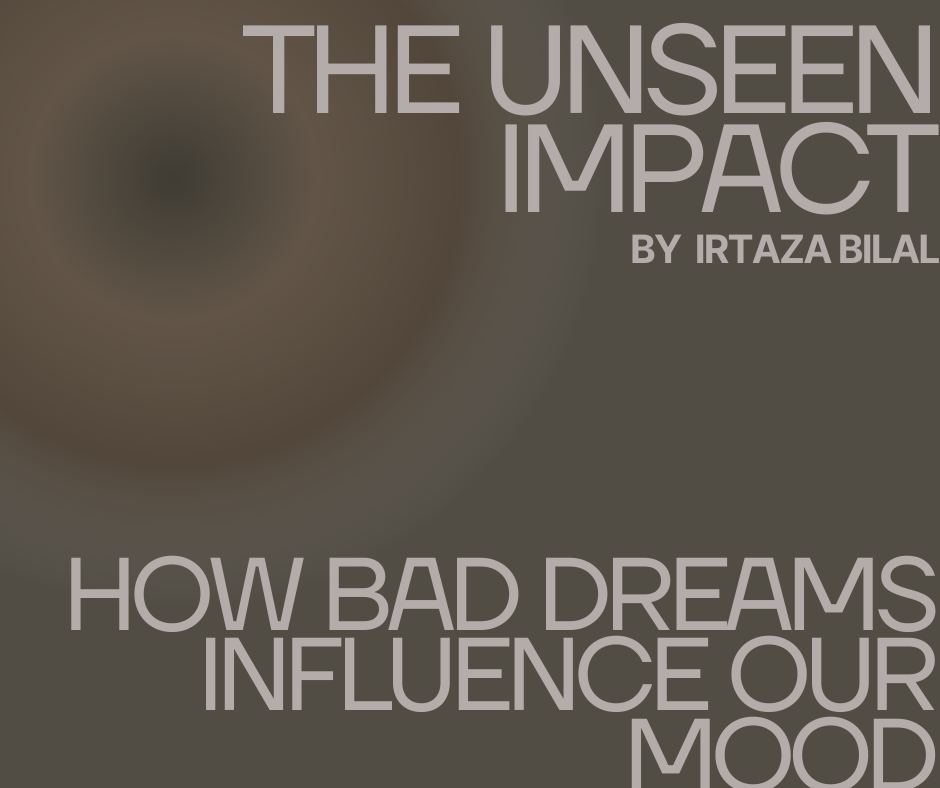Dreams have fascinated humans for centuries, often serving as a source of wonder, intrigue, and even anxiety. While some dreams leave us with a sense of euphoria, others can be downright unsettling. These unsettling dreams, commonly referred to as “bad dreams” or nightmares, can have a significant impact on our mood and emotional well-being. In this blog, we’ll delve into the intriguing connection between bad dreams and our mood.
- Interrupted Sleep Patterns
One of the most immediate ways in which bad dreams can influence our mood is by disrupting our sleep patterns. Nightmares often jolt us awake in the middle of the night, causing sleep fragmentation. This interrupted sleep can leave us feeling fatigued, irritable, and less equipped to face the challenges of the day. As a result, our mood can take a nosedive, affecting our overall emotional state.
- Heightened Stress and Anxiety
Bad dreams often contain elements of fear, stress, and anxiety. When we experience these intense emotions in a dream, our brain reacts as if they were real. This can lead to the release of stress hormones like cortisol, which can linger in our system even after we wake up. Consequently, we may carry these negative emotions into our waking life, causing increased stress and anxiety levels.
- Emotional Processing
Dreams, including bad dreams, serve as a mechanism for our minds to process emotions and experiences. When we have distressing dreams, our brain may be attempting to work through unresolved feelings or fears. While this processing can be beneficial in the long run, it can temporarily leave us feeling emotionally drained or unsettled in the immediate aftermath of a bad dream.
- Impact on Day-to-Day Functioning
The emotional impact of bad dreams can extend beyond the early morning hours. A particularly distressing dream can linger in our thoughts throughout the day, affecting our ability to concentrate and engage in daily tasks. This can result in decreased productivity and a sense of unease, further influencing our mood.
- Fear of Recurrence
The Unseen Impact: How Bad Dreams Influence Our Mood. Experiencing a bad dream can create a fear of recurrence, causing anticipatory anxiety about going to sleep. This fear can contribute to a cycle of negative emotions.
Managing the Influence of Bad Dreams on Mood
While bad dreams can have a significant impact on our mood, there are steps we can take to mitigate their influence:
- Establish a Consistent Sleep Routine: Maintaining a regular sleep schedule can help improve the quality of sleep and reduce the likelihood of experiencing bad dreams.
- Practice Relaxation Techniques: Engage in relaxation exercises such as deep breathing, meditation, or progressive muscle relaxation to reduce stress and anxiety before bedtime.
- Create a Calm Sleep Environment: Ensure your bedroom is conducive to restful sleep by keeping it dark, quiet, and comfortable.
- Limit Stimulants: Avoid caffeine and heavy meals close to bedtime, as these can disrupt sleep.
- Seek Professional Help: If bad dreams persist and significantly impact your mood and well-being, consider speaking with a mental health professional who can provide guidance and support.
Conclusion
Bad dreams are a common and natural part of the human experience. While they can temporarily influence our mood and emotional well-being, it’s essential to remember that they are a reflection of our psyche’s way of processing emotions and experiences. we can minimize the impact of bad dreams on our mood and lead more emotionally balanced lives.
Embracing this connection and learning to navigate the realm of dreams can contribute to our overall emotional resilience and well-being.

